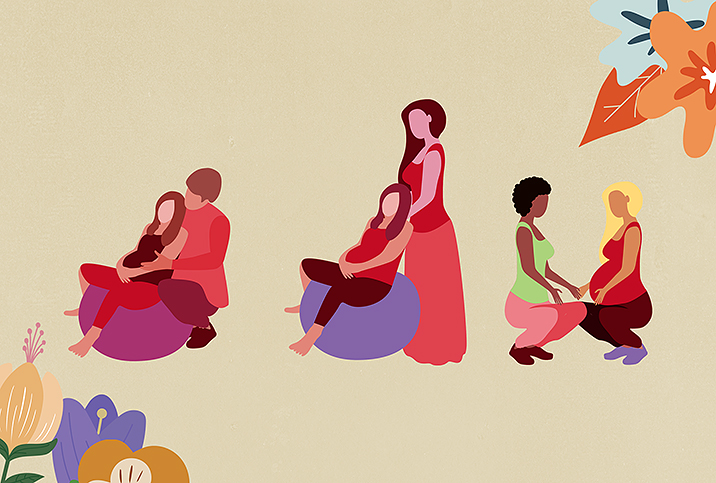Real Stories of Women Who Used a Birth Doula, Midwife and OB-GYN

Key Points
- Birth doulas, midwives and OB-GYNs all have different qualifications and can serve different purposes during the pregnancy process.
- Doulas are nonmedical professionals, while midwives require qualification and OB-GYNs are certified healthcare providers.
- Below are first-person stories and experiences with all three.
Hearing other people's first-hand experiences—in any situation, really—can make it easier for you to choose a path that's best for you. We talked with women who have worked with an OB-GYN, a midwife or a birth doula to see how labor and delivery looked for them.
Here's what those experiences were like.
What is it like working with a midwife?
Midwives are more than delivery-room helpers. They are health professionals, also referred to as certified nurse midwives, who support low-risk pregnancies with prenatal care and are trained to deliver babies at hospitals and birthing centers or in the home, said Kecia Gaither, M.D., a board-certified OB-GYN and the director of perinatal services and maternal-fetal medicine at NYC Health + Hospitals/Lincoln in the Bronx.
Working with a midwife she found via referrals was an overall positive experience for Ali Levine of Nashville. She felt her midwife provided her and her baby with unwavering and unlimited support through pregnancy and the postpartum period.
"[I] truly felt supported, held, loved and cared for," she said.
In particular, her midwife's availability to help her process the birth a few weeks afterward was invaluable.
"That was super important to go over what happened, how I felt, what came up emotionally—go layer by layer and make sure I was in a healed and good place to move forward," Levine said.
Carrie Jeroslow, based in North Carolina's Yadkin Valley, loved the midwife model of care that she described as a more holistic approach to the entire mother-to-be experience, including needs, fears and desires.
"I felt that I wasn't just a number; I was a person who was going through this incredible and oftentimes scary experience," Jeroslow said. "My midwives gave me all the time I needed at each visit to express myself, talk to me, ask me questions, with the desire to really understand what I was experiencing."
Even the midwife's environment played a role. Jeroslow recalled their offices and birthing centers feeling "homey" and more like a living room than a doctor's office.
There were no downsides to her time working with a midwife, Levine said. However, the use of a midwife can be cost-prohibitive for some people.
Both women said they paid around $5,000 for a midwife's services. Jeroslow did note that a government assistance program for prenatal care helped cover a portion of the fee.
A midwife is not a doctor and is best for women with low-risk births. Some hospitals offer a midwife and OB-GYN partnership.
Choose a midwife with labor and delivery experience. When your midwife is part of a team, your OB-GYN can step in if there is a problem during labor or delivery. These complications can include assisted births, a serious tear, fetal distress, elevated blood pressure or postpartum hemorrhage.
Recommended
- What Midwives Actually Do: The Jill of all trades in women's care is often underestimated and misunderstood.
- Finding the Right Doula For You: An emotional support professional can set the tone for a positive birth experience for women.
- Specialist Q&A: What Can an Obstetrician-Gynecologist Do for You?: Kecia Gaither, M.D., explains how she treats all issues related to female reproductive health.
What is it like working with a birth doula?
Birth doulas, prenatal doulas or postpartum doulas are nonmedical professionals who provide women with emotional and physical support during pregnancy, birth and the postpartum period. Doulas do not provide any medical care.
"They engage in aiding women with breathing exercises, relaxation and massage techniques, become an intermediary with medical staff as needed, and assist with breastfeeding education, among other activities centered to provide emotional support to both the mother and father," Gaither said.
Levine described her birth doula as her "coach," helping with her mindset and encouraging her to trust the process and let go of fear. Her doula kept her comfortable during intense contractions and helped take care of her other daughters so her husband could focus on her when she needed him.
"During my birth, she was incredible and not only showed up mentally but truly held me in intense moments, and allowed me to fall apart and then helped me come back together," Levine said.
Jeroslow loved working with a birth doula and recalls feeling supported and cared for.
"They massaged my feet, back, petted my hair, walked with me, supported my husband and brought their experience to the birth, which helped me feel more calm, especially when things started getting scary," she said.
As for cons of doula care, the cost—it can be $1,200 or more, depending on your city, Levine said—may be a downside for some people.
Of course, a doula won't have the same kind of training as a healthcare provider or a nurse. They do not provide medical care.
Doula support can reduce anxiety and stress and have an overall positive impact on a birthing mother, a 2023 report suggested.
Clarify during prenatal visits how your birth doula and your partner or spouse will work together to support you and the baby during the birthing process to avoid any confusion, Jeroslow said.
To find the right doula, Levine and Jeroslow shared a few recommendations:
- Ask for referrals.
- Look up reviews.
- Check local birthing centers.
- Interview several birth doulas to find the right fit.
"You want to feel completely comfortable with this person—like the person you can be naked, in pain, vulnerable with," Jeroslow said regarding a doula's support and how to hire a doula.
What is it like working with an OB-GYN?
"An OB-GYN is a provider that has gone to medical school, had a residency, and has taken both a written and oral board exam to become credentialed," Gaither said.
They are skilled in surgical techniques to perform cesarean deliveries.
Levine's experience with an OB-GYN included standard, routine care with quick checkups to make sure she and her baby stayed healthy during pregnancy. She was grateful that her OB-GYN supported her decision to have a vaginal birth after a C-section (VBAC) and said the fact her insurance covered the care was a positive.
"They schedule a lot of women so you can feel like they don't spend enough time or that you may not be able to fully talk about all your feelings during a visit," Jeroslow said.
So if your current doctor isn't a good fit for you, has odd office hours or you don't feel heard, it's OK to shop around for an OB-GYN.
Jeroslow did appreciate, though, that her OB-GYN worked well with her midwife during the birthing process.
"He saw himself as support and worked together with my midwife to assure the best care for me and my baby," she said.
She found peace of mind knowing that OB-GYNs have access to advanced medical equipment and tests to monitor the fetus during pregnancy and labor.
The bottom line
Choosing which type of provider to work with during pregnancy, labor and delivery comes down to a few key factors: medical or surgical histories, pregnancy complications, location of care, cost and insurance coverage, and personal preference, Gaither said.
Speak with your healthcare provider, learn about what your situation may need and decide what options work best for you.


















